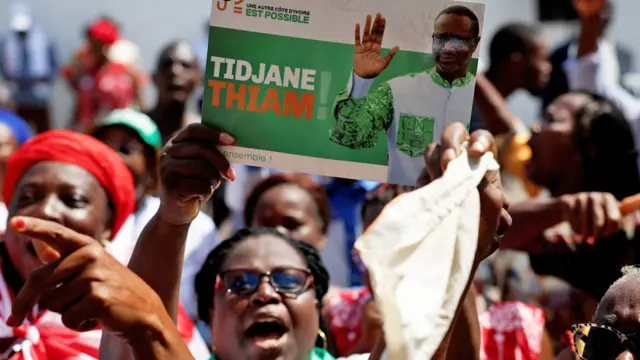Is Ivory Coast’s Red Card Politics an Own Goal for Democracy after Tidjane Thiam’s Ban?
In Ivory Coast, a nation celebrated for its vast cocoa production and remarkable football talent, the intersection of politics and identity has taken a troubling turn. Tidjane Thiam, a prominent businessman and former CEO of leading financial institutions, is currently grappling with significant political hurdles as he aims to run for president in the upcoming October elections. His journey has encountered a serious roadblock following a court ruling regarding his citizenship.
The trajectory of Thiam’s political ambitions took a drastic shift on April 22, when an Ivorian court ruled that he had forfeited his Ivorian citizenship upon acquiring French nationality many years ago—a decision that jeopardizes his eligibility to participate in the electoral process. After living abroad for over two decades, Thiam returned to Ivory Coast in 2022 with aspirations to lead the country. Hailing from a notable family and having previously held positions of power, he appeared to be a formidable candidate to succeed current President Alassane Ouattara, who is now in the twilight of his political career.
The Rise and Fall of Thiam’s Candidacy
Thiam’s political aspirations gained momentum after the passing of former President Henri Konan Bédié, enabling Thiam to secure the nomination as a candidate from the Democratic Party of Ivory Coast (PDCI) on April 17. Yet, his chance at the presidency began to fade with the recent court’s decision, which has cast doubt on whether he can contest in the elections. If the ruling stands, Thiam will face exclusion from the race, where he had positioned himself as a key alternative to the dominant ruling party, the Rally of Houphouëtists for Democracy and Peace (RHDP).
While Thiam’s centrist approach and technocratic background appealed to many voters seeking a semblance of stability and continued economic growth, the ruling has triggered fears that the upcoming elections might lack genuine competition. Three other prominent opposition figures have already been barred from the race, further compounding the public’s disenchantment with the political landscape. This disillusionment is notable in a region of West Africa marked by civil unrest and political instability.
Table: Overview of Political Landscape in Ivory Coast
| Candidate | Political Party | Current Status |
|---|---|---|
| Tidjane Thiam | PDCI | Barred from running |
| Alassane Ouattara | RHDP | Incumbent |
| Laurent Gbagbo | Independent | Barred from running |
| Guillaume Soro | Independent | Barred from running |
The Wider Implications
The Ivorian political situation has now become entwined with identity politics, reminiscent of the turbulent past that led to civil strife. The “ivoirité” law, which previously barred candidates based on alleged foreign origins, has resurfaced as a contentious issue. While the country has made strides towards stability, the current events raise alarm bells about potential re-emergence of division among political factions.
Thiam, reacting to his citizenship ruling, highlighted the contradictions inherent in the application of national identity laws and pointed to the impact this might have on national representation. His arguments reflect a growing concern regarding the future of Ivorian democracy, particularly as it grapples with a young population increasingly disillusioned by the political systems in place.
While there is still an opportunity for negotiation and the potential for Thiam’s candidacy to be restored, the political climate leading up to the elections remains fraught with challenges. The outcome will not only shape Ivorian governance but also resonate across West Africa, a region keenly observing how Ivory Coast navigates its democratic journey.


